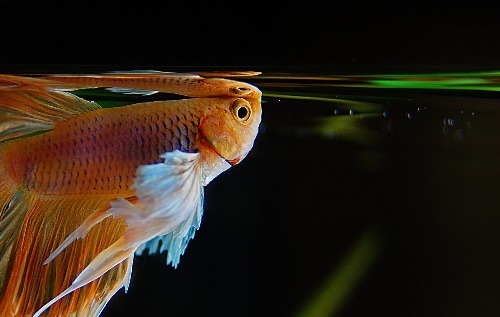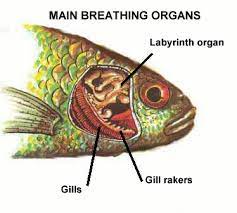Betta fish, also known as Siamese fighting fish, are a popular choice for aquarium enthusiasts due to their vibrant colors and unique personalities. However, have you ever wondered how these tiny fish breathe underwater? Unlike other fish, bettas have a unique organ that allows them to breathe air from the surface of the water, in addition to obtaining oxygen through their gills.
This organ, called the labyrinth organ, is located in the betta’s head and acts like a lung. Betta fish will swim to the surface of the water to take a gulp of air, which they then process through this organ. This allows them to survive in oxygen-poor environments and even survive out of water for short periods of time. In this article, we will explore in more detail how betta fish breathe and the importance of their labyrinth organ.
Betta fish have a unique breathing system that allows them to breathe air from the surface as well as extract oxygen from the water through their gills. They have a special organ called the labyrinth organ, which allows them to absorb oxygen directly from the air. Betta fish need to have access to the water’s surface to take in air and can suffocate if they don’t have access to it.

How Do Betta Fish Breathe?
Betta fish, also known as Siamese fighting fish, are popular pets due to their vibrant colors and beautiful fins. But have you ever wondered how they breathe? Unlike humans, fish breathe through their gills, which are specialized organs located on the sides of their heads. In this article, we’ll explore how Betta fish breathe and what makes them unique.
Gills: The Key to Betta Fish Breathing
Betta fish have four gills, two on each side of their head. These gills are covered by a bony plate called an operculum, which protects them from damage. The gills are made up of tiny filaments that are packed with blood vessels. When water flows over the gills, oxygen from the water diffuses into the blood vessels and carbon dioxide diffuses out. This process is called respiration and is essential for the fish to survive.
Betta fish are able to extract oxygen from the water more efficiently than many other fish because of their labyrinth organ. This organ is located above the gills and allows the fish to breathe air from the surface of the water. This is why Betta fish are often seen coming up to the surface of the water to take a gulp of air.
Water Quality: The Importance of Clean Water
The quality of the water in which a Betta fish lives is crucial for its survival. Dirty water can cause the gills to become clogged with debris, which can make it difficult for the fish to breathe. In addition, high levels of ammonia and nitrite in the water can be toxic to the fish and can damage their gills.
To ensure that your Betta fish has clean water, it’s important to regularly clean their tank or bowl. Changing a portion of the water every week and adding a water conditioner can help maintain a healthy environment for your fish. It’s also important to avoid overcrowding the tank or bowl as this can lead to poor water quality and stress for the fish.
Betta Fish vs Other Fish: What Makes Them Unique?
Betta fish are unique in several ways when it comes to breathing. One of the most notable differences is their labyrinth organ, which allows them to breathe air from the surface of the water. This organ is not present in many other fish species. Additionally, Betta fish are able to extract oxygen from the water more efficiently than many other fish due to the structure of their gills.
Another unique aspect of Betta fish is their ability to survive in low-oxygen environments. In the wild, they often live in shallow, stagnant water where oxygen levels can be low. Their labyrinth organ allows them to breathe air when necessary, which helps them survive in these conditions.
Conclusion: The Importance of Understanding Betta Fish Breathing
In conclusion, Betta fish breathe through their gills and are able to extract oxygen from the water more efficiently than many other fish due to their labyrinth organ. It’s important to maintain clean water in their tank or bowl to ensure their gills remain healthy. Betta fish are unique in their ability to breathe air from the surface of the water and survive in low-oxygen environments, making them fascinating pets to observe and care for.
Frequently Asked Questions
Betta fish are one of the most popular aquarium fish in the world. They are known for their bright colors, long fins, and aggressive behavior. However, many people are curious about how betta fish breathe. In this article, we will answer some of the most frequently asked questions about betta fish breathing.
How do betta fish breathe?
Betta fish are a type of labyrinth fish, which means they have a special organ called the labyrinth organ that allows them to breathe air. This organ is located close to the gills and is used to extract oxygen from the air. Betta fish can breathe both underwater and on the surface of the water. When they are on the surface of the water, they will suck in air and then store it in the labyrinth organ. This air is then used to supplement the oxygen they get from the water.
It is important to note that betta fish still need a well-oxygenated aquarium to survive. They cannot survive in water that is low in oxygen or polluted. It is also important to provide them with plenty of surface area to breathe from, as well as a filter that oxygenates the water.
Why do betta fish need to breathe air?
Betta fish are native to shallow, slow-moving waters in Southeast Asia, such as rice paddies, swamps, and ponds. These waters are often low in oxygen, so betta fish have evolved to be able to breathe air to survive. They can also use their labyrinth organ to breathe when the water is polluted or low in oxygen.
Even though betta fish can breathe air, they still need oxygen from the water to survive. Without enough oxygen in the water, they can become stressed, lethargic, and even die. It is important to maintain good water quality in their aquarium and provide them with plenty of surface area to breathe from.
Can betta fish drown?
While betta fish are able to breathe air, they can still drown if they are unable to access the surface of the water. This can happen if they are trapped under decorations or plants, or if the water level is too low. It is important to provide betta fish with plenty of open swimming space and a way to reach the surface of the water.
If you notice that your betta fish is struggling to breathe or is gasping at the surface of the water, it could be a sign that the water is low in oxygen. You should test the water quality and consider adding an air stone or increasing the water flow to improve oxygenation.
How can you tell if a betta fish is breathing properly?
A healthy betta fish should be able to breathe comfortably both underwater and on the surface of the water. If you notice that your betta fish is gasping at the surface of the water or struggling to breathe, it could be a sign of a problem. Other signs of breathing problems in betta fish include lethargy, loss of appetite, and clamped fins.
If you suspect that your betta fish is having breathing problems, you should test the water quality and make sure that there is enough oxygen in the aquarium. You should also check for any signs of illness or injury and consult with a veterinarian if necessary.
Can betta fish live in a bowl without a filter?
While betta fish are often sold in small bowls without a filter, this is not a suitable environment for them to live in long-term. Betta fish still require good water quality and oxygenation to survive, even in a small aquarium. Without a filter, the water in a bowl can quickly become polluted and low in oxygen, which can be harmful or even deadly to the fish.
If you want to keep a betta fish, it is important to provide them with a suitable aquarium that is properly cycled and filtered. A 5-gallon aquarium with a filter and heater is a good starting point, but larger aquariums are even better. It is also important to maintain good water quality and provide plenty of hiding spots and stimulation for the fish.

A Closer Look at Betta Fish
In conclusion, betta fish have a unique respiratory system that allows them to breathe air from the surface as well as extract oxygen from the water. Their labyrinth organ, located in their gills, acts as a supplementary respiratory organ, providing them with the ability to survive in environments with low oxygen levels. However, it is important to maintain a clean and well-oxygenated tank to ensure the health and longevity of your betta fish.
Overall, understanding how betta fish breathe is crucial for their proper care and well-being. By providing them with a suitable environment and monitoring their water quality, you can help ensure that your betta fish thrive in their home. So, feel free to explore more about betta fish and their unique characteristics, and take good care of them to enjoy their colorful presence for years to come.
